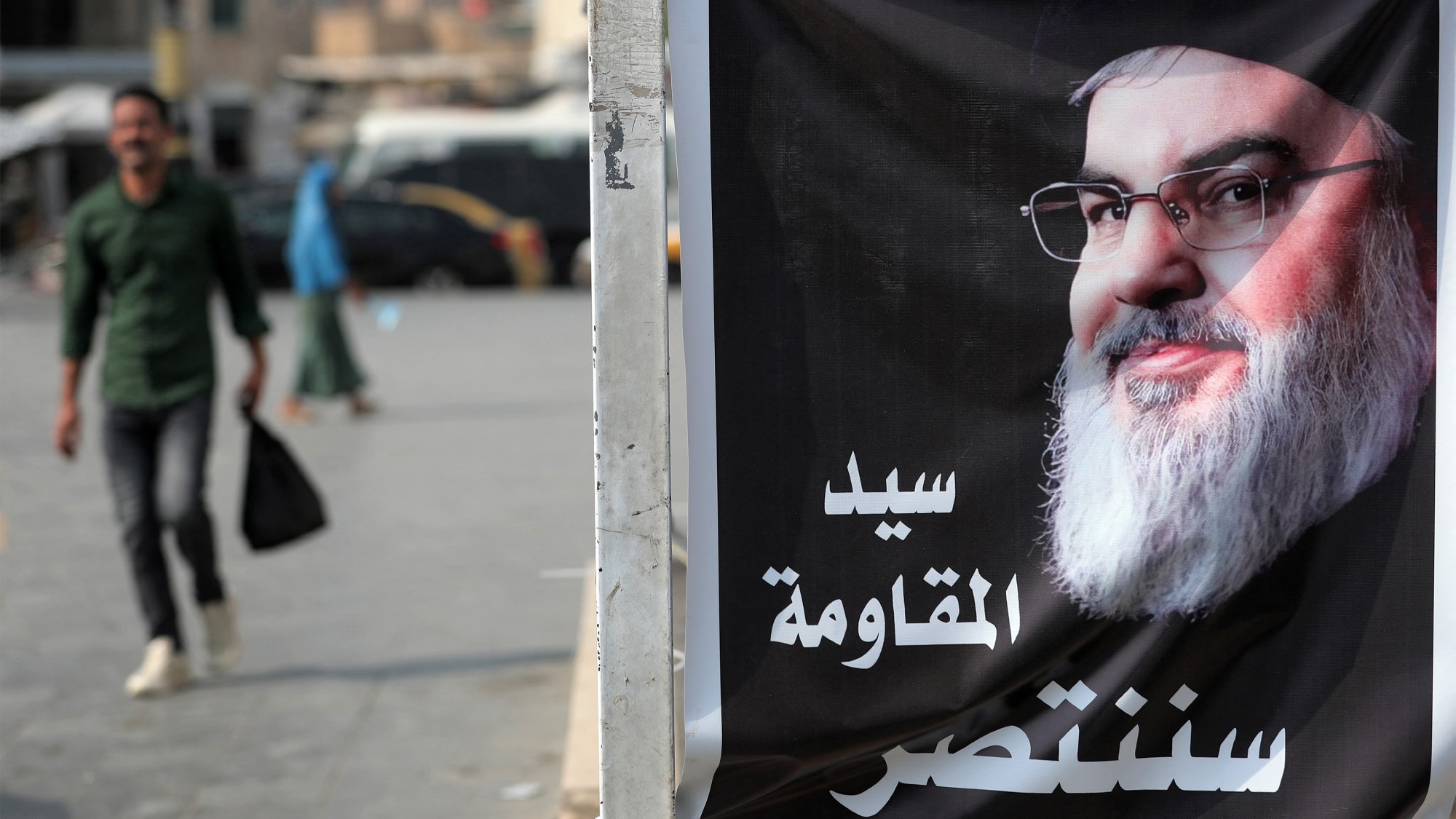The death of Hassan Nasrallah
The killing of Hezbollah's leader is 'seismic event' in the conflict igniting in the Middle East

A free daily email with the biggest news stories of the day – and the best features from TheWeek.com
You are now subscribed
Your newsletter sign-up was successful
Hassan Nasrallah was one of the most revered and reviled figures in the Middle East, said Jared Malsin and Sune Engel Rasmussen in The Wall Street Journal. To his supporters, he was an "almost messianic" character, who commanded the loyalty of Shia Muslims across the region, and who became the "single-most important" actor in Iran's "axis of resistance" during his three decades as Hezbollah's leader. To his adversaries, he was an "antisemitic terrorist ... responsible for hundreds of American and Israeli deaths".
His death is a seismic event – one that deprives Hezbollah of the figurehead and strategist who transformed it from a small militia into a powerful political party with massive military might and "a global reach".
Born in Beirut in 1960, Nasrallah spent his childhood reading Islamic texts while his siblings played football, said Lawrence Joffe in The Guardian. When Lebanon's civil war broke out in 1975, he joined Amal, a party representing the marginalised Shia population; a year later, he met Ayatollah Ruhollah Khomeini, the future leader of Iran's Islamic Revolution, while studying at a seminary in Iraq.
The Week
Escape your echo chamber. Get the facts behind the news, plus analysis from multiple perspectives.

Sign up for The Week's Free Newsletters
From our morning news briefing to a weekly Good News Newsletter, get the best of The Week delivered directly to your inbox.
From our morning news briefing to a weekly Good News Newsletter, get the best of The Week delivered directly to your inbox.
Following Israel's invasion of Lebanon in 1982, Nasrallah joined the paramilitary group that became Hezbollah, said The Economist. A decade later, its leader, Abbas al-Musawi, was killed in an Israeli air strike, and Nasrallah took over. Unlike other paramilitary leaders, he hadn't seen combat, said Raya Jalabi in the FT. But he gained respect as a commander, a respect that grew when his 18-year-old son was killed in a firefight with Israeli troops.
His status was further enhanced when Hezbollah drove Israeli troops out of southern Lebanon in 2000, and by its self-proclaimed victory over Israel in the 34-day war in 2006. All the while, Nasrallah "weaponised his charisma" to hone a "cult of personality": he was "a powerful orator" whose voice was rendered unmistakable to many by a speech impediment that meant he couldn't say his Rs.
Throughout his career, Nasrallah displayed a "gangster's disdain for human life", said The Times. He rejoiced in killing Jews, ordering hits as far afield as Israel's embassy in Buenos Aires. And he was just as careless with the lives of Muslims and Christians: Hezbollah was behind the 2005 assassination of Lebanon's then-PM Rafik Hariri, and supported Bashar al-Assad in Syria's brutal civil war.
His likely successor, Hashem Safieddine, is said to be even more hardline, said Samer Al-Atrush in the same paper. But since Hezbollah's leadership has been "all but wiped out" by Israel's latest attacks, his focus will have to be on survival – his own and his organisation's.
A free daily email with the biggest news stories of the day – and the best features from TheWeek.com
One way or another, however, Hezbollah will "slowly rebuild", said Adam Shatz in the London Review of Books, as Nasrallah and his ilk are replaced by "a new and no less embittered generation of leaders" who will remember the "killings" and "maimings" caused by Israel's current campaign. Yes, Nasrallah's killing was a "humiliating" setback for the movement, "but nothing feeds resistance like humiliation".
-
 How the FCC’s ‘equal time’ rule works
How the FCC’s ‘equal time’ rule worksIn the Spotlight The law is at the heart of the Colbert-CBS conflict
-
 What is the endgame in the DHS shutdown?
What is the endgame in the DHS shutdown?Today’s Big Question Democrats want to rein in ICE’s immigration crackdown
-
 ‘Poor time management isn’t just an inconvenience’
‘Poor time management isn’t just an inconvenience’Instant Opinion Opinion, comment and editorials of the day
-
 Corruption: The spy sheikh and the president
Corruption: The spy sheikh and the presidentFeature Trump is at the center of another scandal
-
 Putin’s shadow war
Putin’s shadow warFeature The Kremlin is waging a campaign of sabotage and subversion against Ukraine’s allies in the West
-
 The fall of the generals: China’s military purge
The fall of the generals: China’s military purgeIn the Spotlight Xi Jinping’s extraordinary removal of senior general proves that no-one is safe from anti-corruption drive that has investigated millions
-
 Syria’s Kurds: abandoned by their US ally
Syria’s Kurds: abandoned by their US allyTalking Point Ahmed al-Sharaa’s lightning offensive against Syrian Kurdistan belies his promise to respect the country’s ethnic minorities
-
 Grok in the crosshairs as EU launches deepfake porn probe
Grok in the crosshairs as EU launches deepfake porn probeIN THE SPOTLIGHT The European Union has officially begun investigating Elon Musk’s proprietary AI, as regulators zero in on Grok’s porn problem and its impact continent-wide
-
 Israel retrieves final hostage’s body from Gaza
Israel retrieves final hostage’s body from GazaSpeed Read The 24-year-old police officer was killed during the initial Hamas attack
-
 Panama and Canada are negotiating over a crucial copper mine
Panama and Canada are negotiating over a crucial copper mineIn the Spotlight Panama is set to make a final decision on the mine this summer
-
 Iran unleashes carnage on its own people
Iran unleashes carnage on its own peopleFeature Demonstrations began in late December as an economic protest